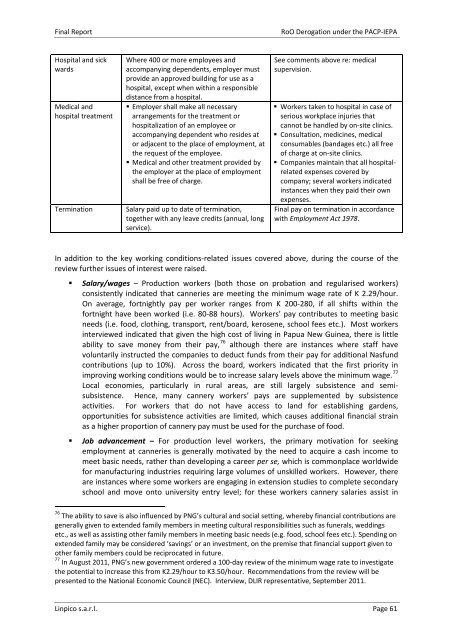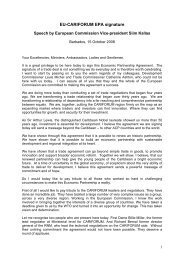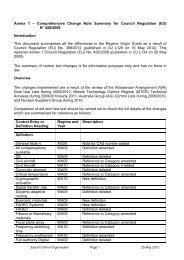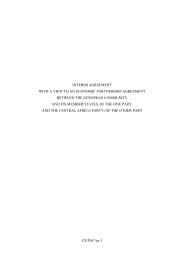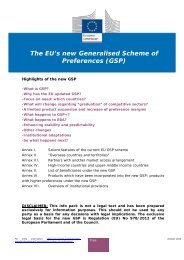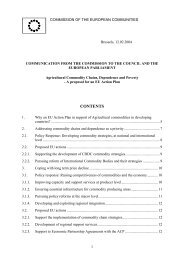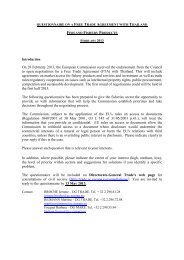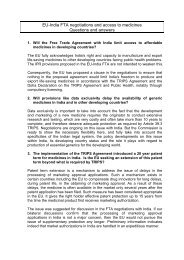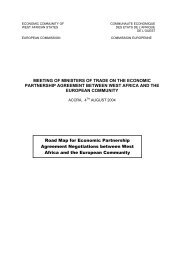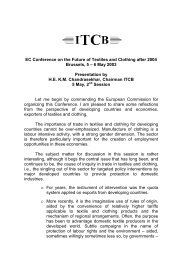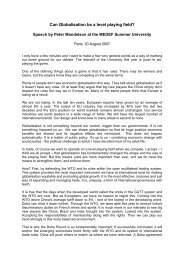Report on the Implementation of the derogation to ... - Trade Websites
Report on the Implementation of the derogation to ... - Trade Websites
Report on the Implementation of the derogation to ... - Trade Websites
Create successful ePaper yourself
Turn your PDF publications into a flip-book with our unique Google optimized e-Paper software.
Final <str<strong>on</strong>g>Report</str<strong>on</strong>g><br />
RoO Derogati<strong>on</strong> under <strong>the</strong> PACP-IEPA<br />
Hospital and sick<br />
wards<br />
Medical and<br />
hospital treatment<br />
Terminati<strong>on</strong><br />
Where 400 or more employees and<br />
accompanying dependents, employer must<br />
provide an approved building for use as a<br />
hospital, except when within a resp<strong>on</strong>sible<br />
distance from a hospital.<br />
• Employer shall make all necessary<br />
arrangements for <strong>the</strong> treatment or<br />
hospitalizati<strong>on</strong> <strong>of</strong> an employee or<br />
accompanying dependent who resides at<br />
or adjacent <strong>to</strong> <strong>the</strong> place <strong>of</strong> employment, at<br />
<strong>the</strong> request <strong>of</strong> <strong>the</strong> employee.<br />
• Medical and o<strong>the</strong>r treatment provided by<br />
<strong>the</strong> employer at <strong>the</strong> place <strong>of</strong> employment<br />
shall be free <strong>of</strong> charge.<br />
Salary paid up <strong>to</strong> date <strong>of</strong> terminati<strong>on</strong>,<br />
<strong>to</strong>ge<strong>the</strong>r with any leave credits (annual, l<strong>on</strong>g<br />
service).<br />
See comments above re: medical<br />
supervisi<strong>on</strong>.<br />
• Workers taken <strong>to</strong> hospital in case <strong>of</strong><br />
serious workplace injuries that<br />
cannot be handled by <strong>on</strong>-site clinics.<br />
• C<strong>on</strong>sultati<strong>on</strong>, medicines, medical<br />
c<strong>on</strong>sumables (bandages etc.) all free<br />
<strong>of</strong> charge at <strong>on</strong>-site clinics.<br />
• Companies maintain that all hospitalrelated<br />
expenses covered by<br />
company; several workers indicated<br />
instances when <strong>the</strong>y paid <strong>the</strong>ir own<br />
expenses.<br />
Final pay <strong>on</strong> terminati<strong>on</strong> in accordance<br />
with Employment Act 1978.<br />
In additi<strong>on</strong> <strong>to</strong> <strong>the</strong> key working c<strong>on</strong>diti<strong>on</strong>s-related issues covered above, during <strong>the</strong> course <strong>of</strong> <strong>the</strong><br />
review fur<strong>the</strong>r issues <strong>of</strong> interest were raised.<br />
• Salary/wages – Producti<strong>on</strong> workers (both those <strong>on</strong> probati<strong>on</strong> and regularised workers)<br />
c<strong>on</strong>sistently indicated that canneries are meeting <strong>the</strong> minimum wage rate <strong>of</strong> K 2.29/hour.<br />
On average, fortnightly pay per worker ranges from K 200-280, if all shifts within <strong>the</strong><br />
fortnight have been worked (i.e. 80-88 hours). Workers’ pay c<strong>on</strong>tributes <strong>to</strong> meeting basic<br />
needs (i.e. food, clothing, transport, rent/board, kerosene, school fees etc.). Most workers<br />
interviewed indicated that given <strong>the</strong> high cost <strong>of</strong> living in Papua New Guinea, <strong>the</strong>re is little<br />
ability <strong>to</strong> save m<strong>on</strong>ey from <strong>the</strong>ir pay, 76 although <strong>the</strong>re are instances where staff have<br />
voluntarily instructed <strong>the</strong> companies <strong>to</strong> deduct funds from <strong>the</strong>ir pay for additi<strong>on</strong>al Nasfund<br />
c<strong>on</strong>tributi<strong>on</strong>s (up <strong>to</strong> 10%). Across <strong>the</strong> board, workers indicated that <strong>the</strong> first priority in<br />
improving working c<strong>on</strong>diti<strong>on</strong>s would be <strong>to</strong> increase salary levels above <strong>the</strong> minimum wage. 77<br />
Local ec<strong>on</strong>omies, particularly in rural areas, are still largely subsistence and semisubsistence.<br />
Hence, many cannery workers’ pays are supplemented by subsistence<br />
activities. For workers that do not have access <strong>to</strong> land for establishing gardens,<br />
opportunities for subsistence activities are limited, which causes additi<strong>on</strong>al financial strain<br />
as a higher proporti<strong>on</strong> <strong>of</strong> cannery pay must be used for <strong>the</strong> purchase <strong>of</strong> food.<br />
• Job advancement – For producti<strong>on</strong> level workers, <strong>the</strong> primary motivati<strong>on</strong> for seeking<br />
employment at canneries is generally motivated by <strong>the</strong> need <strong>to</strong> acquire a cash income <strong>to</strong><br />
meet basic needs, ra<strong>the</strong>r than developing a career per se, which is comm<strong>on</strong>place worldwide<br />
for manufacturing industries requiring large volumes <strong>of</strong> unskilled workers. However, <strong>the</strong>re<br />
are instances where some workers are engaging in extensi<strong>on</strong> studies <strong>to</strong> complete sec<strong>on</strong>dary<br />
school and move <strong>on</strong><strong>to</strong> university entry level; for <strong>the</strong>se workers cannery salaries assist in<br />
76 The ability <strong>to</strong> save is also influenced by PNG’s cultural and social setting, whereby financial c<strong>on</strong>tributi<strong>on</strong>s are<br />
generally given <strong>to</strong> extended family members in meeting cultural resp<strong>on</strong>sibilities such as funerals, weddings<br />
etc., as well as assisting o<strong>the</strong>r family members in meeting basic needs (e.g. food, school fees etc.). Spending <strong>on</strong><br />
extended family may be c<strong>on</strong>sidered ‘savings’ or an investment, <strong>on</strong> <strong>the</strong> premise that financial support given <strong>to</strong><br />
o<strong>the</strong>r family members could be reciprocated in future.<br />
77 In August 2011, PNG’s new government ordered a 100-day review <strong>of</strong> <strong>the</strong> minimum wage rate <strong>to</strong> investigate<br />
<strong>the</strong> potential <strong>to</strong> increase this from K2.29/hour <strong>to</strong> K3.50/hour. Recommendati<strong>on</strong>s from <strong>the</strong> review will be<br />
presented <strong>to</strong> <strong>the</strong> Nati<strong>on</strong>al Ec<strong>on</strong>omic Council (NEC). Interview, DLIR representative, September 2011.<br />
Linpico s.a.r.l. Page 61


